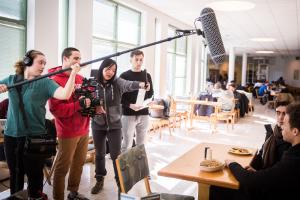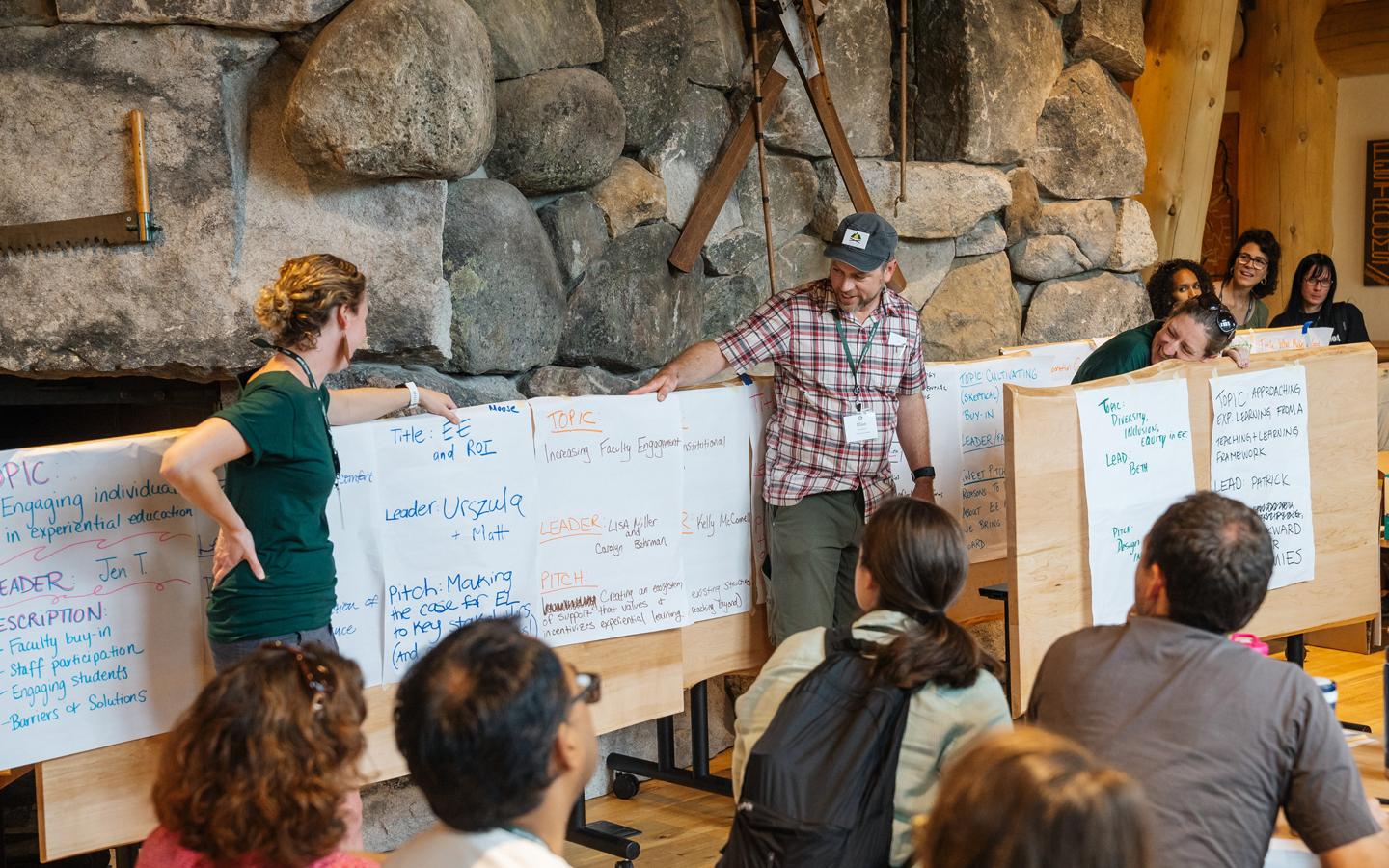
Student Experiential Learning Fund
Support the Student Experiential Learning Fund to develop students' leadership skills.
At Mt. Moosilauke, educators share ways to expand experiential opportunities.

This summer, a group of experiential educators from around the country gathered at the Moosilauke Ravine Lodge for the Dartmouth Experiential Learning and Teaching Adventure Summit (DELTA).
The event was organized by Ashley Kehoe Blackburn, the associate director for experiential learning at the Dartmouth Center for the Advancement of Learning (DCAL). Blackburn leads the College’s Experiential Learning Initiative, a five-year pilot program launched in fall 2015 to help coordinate and expand opportunities for experiential learning at Dartmouth.
To date, the initiative has funded 42 pilot projects and formally engaged 100 faculty, 70 staff, and hundreds of students from 20 departments in the arts and sciences, seven co-curricular centers, and the Tuck School of Business, Thayer School of Engineering, and the Geisel School of Medicine.
The DELTA Summit represented a midpoint in the initiative’s progress, and an opportunity to showcase Dartmouth’s commitment to experiential education, Blackburn said. “We’ve learned a lot, we’ve connected with lots of different organizations and institutions doing this work, so why not pull folks together to talk about best practices and promising models of experiential learning?”
I felt that the conference is providing useful tools to enable us to design better programming—to design programs more intentionally and to measure outcomes more effectively.
Participation in the summit was capped at 60, and spots filled up right away, with organizers receiving more than twice as many applications as they could accept, from throughout the U.S. as well as the U.K. and Canada. “There’s a need for this,” said Blackburn, who says that half of the spots were reserved for Dartmouth faculty and staff. The event was facilitated by Dartmouth staff, and participants included faculty and staff from higher education—including several from Dartmouth—as well as K-12 teachers.
“One of our big goals is building the capacity of our own faculty and staff to do experiential learning in the best possible way—so ultimately it serves Dartmouth students,” Blackburn said. “We have designed this conference to be experiential—to model the good practices that we know work with experiential learning, with opportunities for small group discussion and community building.”
The summit began in Hanover with a reception at the Top of the Hop, where participants were divided into the “troops” they would belong to for the whole conference. Troops met periodically throughout the summit to reflect on what they were learning and share ideas. The following day, the group was bused to the Moosilauke Ravine Lodge, where they spent the morning learning about the foundations of experiential learning from representatives of the National Society for Experiential Education (NSEE), and the afternoon participating in intensive discussions on everything from how to assess student learning to how to engage faculty, students, staff, and administrators who are new to experiential learning approaches. Participants spent the night at Moosilauke, and in the morning had the option to hike the mountain with the group or visit Franconia Notch.
Sessions focused on storytelling; how to assess student learning; how to map learning outcomes to institutional values; and how to design effective and inclusive experiences, among other topics. In a session called “Designing High-Impact Learning Experiences,” participant Rosie Kerr ’97, Dartmouth’s director of sustainability, noted that learning happens when students stretch beyond their comfort zones—but not so far that they feel unsafe.
Later, Kerr talked about what she hoped to gain from the summit. “I felt that the conference is providing useful tools to enable us to design better programming—to design programs more intentionally and to measure outcomes more effectively,” she said. “That’s something I have a particular interest in as we deploy programs that reach more students.”
Sarah Berger, senior adviser for the Health Professions Program, said the summit helped clarify best practices that she hopes to use with students in the coming year. “It’s been great to think about what the foundational pieces are that make experiential learning successful,” she said.
Melanie Rathburn, an associate professor of biology and chair of the biology department at Mount Royal University in Calgary, Alberta, echoed that feeling.
“I came so I can better understand some of the best practices and get some ideas about what people are doing at other institutions that we might be able to implement at ours,” Rathburn said. “So far I’ve got a few pages of ideas already, so it’s going great, and we’re only 12 hours in.”
“The first half of our work with experiential learning has really been building momentum, building relationships across campus, and trying out ideas and getting some proofs of concept,” Blackburn said.
“The second half is about creating standards, building infrastructure, implementing best practices, and truly institutionalizing experiential learning at Dartmouth so that we’re making it easier for faculty and students to engage in experiences and reflection. I’m looking forward to trying to sustain some of the models that have shown promise and to continue to grow the good work that we’re seeing faculty and students doing across campus.”
Kerr said she’s glad the College is making its commitment to experiential learning more explicit. “Experiential learning is part of Dartmouth’s DNA,” she said. “Dartmouth has always supported and enabled passionate students to pursue their interests. You see the fingerprints of that all over Dartmouth. Every single program in the Sustainability Office started with a student, and that’s very typical. Hands-on learning has shaped the College in indelible ways, and that has been to the College’s benefit.”
Dartmouth has always supported and enabled passionate students to pursue their interests. Hands-on learning has shaped the College in indelible ways, and that has been to the College’s benefit.